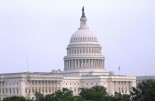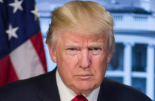M&G: Impact of the US election outcomes on treasury yields and dollar

Rob Burrows, Fund Manager, M&G Investments Fixed Income team, shares his views on the potential impact of the different US election outcomes on both treasury yields and the dollar.
Burrows: 'As the 2024 U.S. presidential election approaches, the financial markets are bracing for potential shifts that could influence everything from interest rates to the strength of the U.S. dollar. The two candidates, Vice President Kamala Harris and former President Donald Trump, are campaigning along traditional lines. Republicans are the party of low taxes and reduced spending while the Democrats focus on increasing taxes and increasing social expenditure. The winds are blowing in the same direction regarding foreign policy, particularly towards China. However, Trump is proposing to go much further and impose tariffs of circa 10-20% on all imports and 60% on those from China. Pursuing protectionist policies typically reduces growth and increases inflation.
Ultimately, the problem lies with large deficits and high levels of outstanding debt.
Neither candidates’ policies plan to address this issue. Under both parties, deficits will likely increase, with Trump's proposals the most impactful.
Investors are understandably more focused on a Republican victory given the potential increase in volatility and, as a result, have been positioning for the 'Trump Trade'.
Trump's economic policies, characterised by large tax cuts and protectionism, are expected to significantly increase the federal deficit. If Trump were to push for more tax cuts without corresponding spending cuts, the Treasury would likely need to issue more debt to cover the shortfall. This increase in supply could push Treasury yields higher, particularly at the longer end of the curve, as investors demand more return for holding what they might perceive as riskier debt.
However, Trump's deregulatory stance and potential efforts to boost economic growth could mitigate some of these pressures by spurring higher GDP growth and potentially increasing tax revenues. However, the net impact on the Treasury market would likely be a period of increased volatility, with investors closely watching for signs of fiscal discipline or lack thereof.
Impact on the U.S. Dollar
Trump's presidency was marked by a strong dollar, partly due to his trade policies and the perception of the U.S. as a relatively safer investment compared to other regions. However, his return to office could introduce significant uncertainty, particularly if he reignites trade wars or adopts a more isolationist stance. These policies could lead to short-term dollar strength, especially if global risks increase, but over the longer term, the dollar could weaken if Trump's policies lead to higher deficits and reduced foreign investment in U.S. assets.
A key wildcard is Trump's potential pressure on the Federal Reserve to keep interest rates low, which could lead to inflationary pressures and a weaker dollar over time. Currency markets may also react negatively to signs of renewed geopolitical tensions or erratic trade policies, leading to increased dollar volatility.
Whether all of these policies can be implemented depends very much on whether the incumbent wins Congress, the Senate, and the presidency, thereby achieving a 'clean sweep'.
The 2024 U.S. presidential election presents two very different paths for the Treasury market and the U.S. dollar. A Harris victory could mean a continuation of steady, if unspectacular, economic policies that, on a relative basis, promote stability, with a moderate impact on Treasury yields and a potentially strong dollar. On the other hand, a Trump win could bring back a more unpredictable and volatile environment, with higher Treasury yields and a mixed outlook for the dollar depending on the global reaction to his policies.
Regardless of who wins, the election is set to be a pivotal event that could reshape the financial landscape for years to come.'









